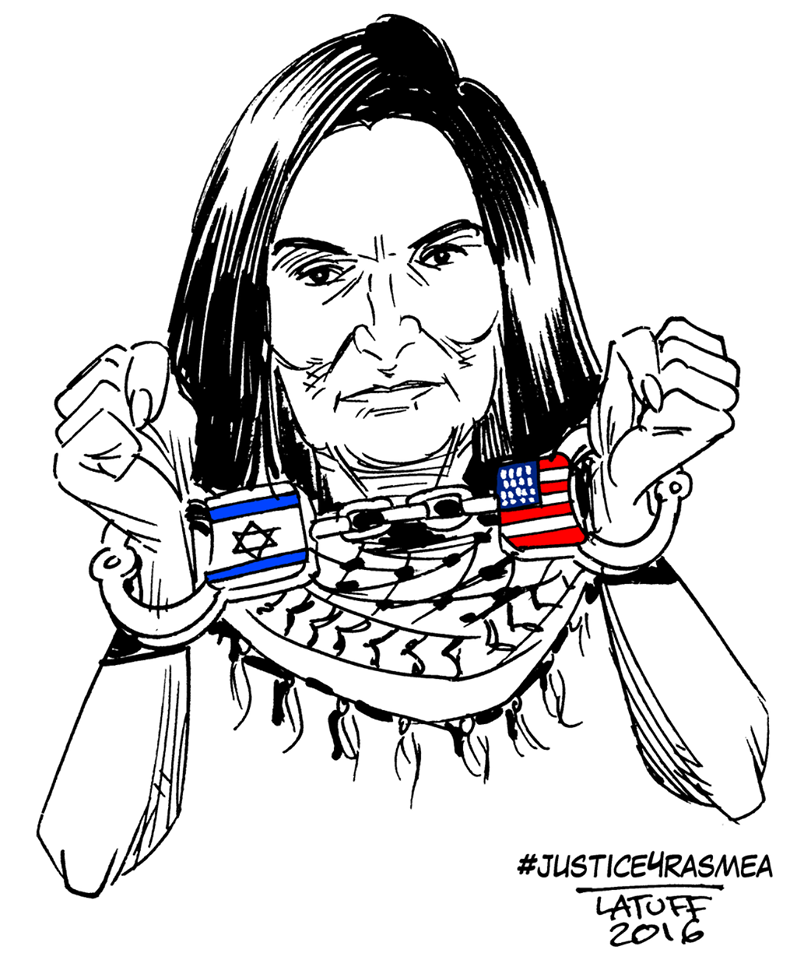New release from USPCN and the Rasmea Defense Committee:
Rasmea Odeh, a survivor of vicious torture at the hands of the Israeli military, will be compelled to undergo hours of psychological evaluation by a government forensic examiner, according to a ruling by Federal Judge Gershwin Drain. Drain cancelled a September 22 hearing on the matter in Detroit, where supporters from across the Midwest had planned to join Rasmea.
The 69-year-old Rasmea is a legend in the Palestine national movement. In Drain’s courtroom in 2014, she was convicted of a politically-motivated immigration charge, and in 2015, sentenced to 18 months in prison and deportation. Rasmea appealed the decision, arguing that Drain had denied her defense the right to make its case.
In February of this year, in a major legal victory, the Sixth Circuit Court of Appeals agreed that Drain was wrong when he refused to allow defense attorneys to present evidence that Rasmea suffers from Post-Traumatic Stress Disorder (PTSD). The PTSD caused her to misunderstand the questions about the unlawful conviction and imprisonment she suffered under the Israeli occupation. At the trial, Rasmea was not allowed to tell the story of Israel forcing her to falsely confess to alleged bombings in 1969, when she endured over three weeks of brutal sexual, physical, and psychological torture at the hands of the Israeli military.
The appeals court sent the case back to Drain for an evidentiary Dauberthearing, where the government will challenge the validity and admissibility of testimony by torture expert and clinical psychologist, Dr. Mary Fabri. With Drain’s latest decision, issued yesterday, Rasmea will be subjected to as many as six sessions (up to 18 hours) of interrogation by a government expert seeking to support its claim that Fabri’s testimony should still be excluded.
By forcing Rasmea to meet with a government expert whose job it is to discredit her, she faces the real possibility of being re-traumatized by the horrible experiences of her torture. The government is clearly using legal maneuvers to convolute a medical diagnosis by a world-renowned mental health professional, and Drain is allowing it.
In his decision, Drain rejected the defense argument that it is harmful to Rasmea’s mental health to be forced to repeatedly discuss the rape and torture she suffered. He sided with the prosecution, claiming that Rasmea had discussed the torture on “numerous occasions” … “in the media and elsewhere.”
Lead defense attorney Michael Deutsch responded today: “That is just not true. While Rasmea has become the most famous target of a political trial in the U.S. today, she has always avoided discussion of the crimes committed against her in that Israeli prison in 1969. The government case against Rasmea is based on the word of her Israeli captors, and yet at every turn, Judge Drain has denied her defense the right to challenge those statements in his courtroom. Once again, his latest decision favors the prosecution’s endless attempts to cover up the crimes of Israel against Rasmea.”
The hearing on the challenge to Fabri’s expert testimony is set for November 29, the International Day of Solidarity with the Palestinian People. Rasmea’s supporters are already making plans to stand with her in Detroit that day, and they continue to educate the public on Israel’s crimes and this specific case, as well as raise money for the defense.
Discover more from Samidoun: Palestinian Prisoner Solidarity Network
Subscribe to get the latest posts sent to your email.





